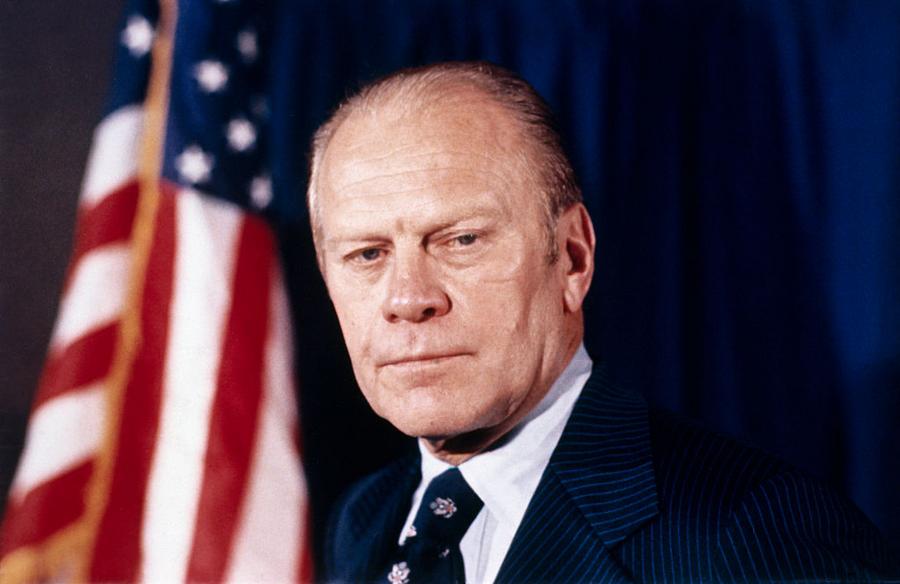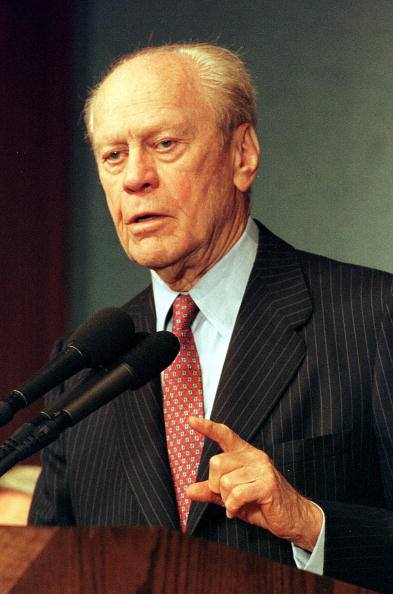Gerald Ford at a Glance
- Categories: Politicians, Politicians > Republicans
- Net Worth: $7 Million
- Birthdate: Jul 14, 1913 - Dec 26, 2006 (93 years old)
- Birthplace: Omaha
- Gender: Male
- Profession: Lawyer, American football player, Politician
- Nationality: United States of America
- Height: 6 ft (1.83 m)
Gerald Ford’s Net Worth: A Look at His Life, Career, and Finances
Introduction: Gerald Ford’s Financial Legacy
Gerald Ford, the 38th President of the United States, left behind a legacy of integrity, leadership, and a net worth that, while modest compared to some, reflects a life dedicated to public service. At the time of his death in 2006, Ford’s net worth was estimated at $7 million, equivalent to approximately $11 million today when adjusted for inflation. This article delves into the life and times of Gerald Ford, examining his financial standing in the context of his remarkable career, from his early life to his time in the White House and beyond.
Early Life and Education
Born Leslie Lynch King Jr. on July 14, 1913, in Omaha, Nebraska, Gerald Ford’s early life was marked by significant change. His parents, Dorothy Ayer Gardner and Leslie Lynch King Sr., separated shortly after his birth. His mother moved with him to Oak Park, Illinois, and later to Grand Rapids, Michigan, where she divorced King Sr. and remarried Gerald Rudolf Ford. Though not formally adopted, his name was legally changed to Gerald Ford Jr. His formative years were spent in Grand Rapids, where he excelled as a student and athlete. He achieved the rank of Eagle Scout in the Boy Scouts of America and captained the football team at Grand Rapids South High School. His athletic prowess earned him recognition, including a spot on the All-City team, and attracted college recruiters.
Ford attended the University of Michigan, where he played center, linebacker, and long snapper on the football team, graduating with a Bachelor of Arts degree in economics in 1935. He declined offers from the Detroit Lions and Green Bay Packers to pursue a career in coaching at Yale University. He later enrolled at Yale Law School, graduating in 1941. His legal studies were interrupted by World War II, during which he enlisted in the U.S. Navy after the attack on Pearl Harbor, serving aboard the USS Monterey. He received an honorable discharge and several military awards in 1946.
Political Career: From Congressman to Vice President
After his military service, Ford entered the world of politics, becoming active in local Republican circles in 1946. He successfully ran for a seat in the House of Representatives in 1948, representing Michigan’s 5th congressional district from 1949 to 1973. During his tenure, he gained a reputation as a skilled negotiator and reconciler, earning the respect of colleagues across the political spectrum. He served on the House Appropriations Committee and the Defense Appropriations Subcommittee. Ford’s political philosophy was characterized as moderate on domestic issues, internationalist in foreign affairs, and conservative in fiscal policy.
In 1963, President Lyndon B. Johnson appointed Ford to the Warren Commission, which investigated the assassination of President John F. Kennedy. His role included preparing a biography of the accused assassin, Lee Harvey Oswald. From 1965 to 1973, Ford served as the House Minority Leader. In 1973, following Spiro Agnew’s resignation, President Richard Nixon selected Ford as Vice President. Ford was the first Vice President appointed under the provisions of the 25th Amendment.
The Presidency: Navigating a Turbulent Time
On August 9, 1974, Gerald Ford assumed the presidency after Richard Nixon’s resignation amidst the Watergate scandal. He became the only person to become president without having been elected to either the presidency or vice presidency. His immediate challenge was to restore public trust in the government, and he took several steps aimed at transparency and accountability. One of his most controversial decisions was the pardon of Richard Nixon for his role in the Watergate scandal. Ford argued that the pardon was necessary to end the national division and allow the country to move forward, but it drew considerable criticism.
During his presidency, Ford confronted a difficult economic climate, marked by high inflation and a recession. He launched the “Whip Inflation Now” (WIN) campaign to combat rising prices. In foreign policy, Ford signed the Helsinki Accords, which aimed to ease tensions during the Cold War. His administration saw the end of the Vietnam War and a shift towards détente with the Soviet Union. In 1976, he narrowly lost the presidential election to Jimmy Carter.

8/13/1974-Washington, DC: President Gerald Ford (via Getty)
Personal Life and Legacy
Gerald Ford’s personal life was characterized by a strong family and commitment to community. He married Elizabeth Bloomer in 1948, and they had four children: Michael, John, Steven, and Susan. His family remained a significant part of his life throughout his political career and beyond. Ford was also involved in various organizations, including Freemasonry, where he achieved the 33rd degree in the Scottish Rite. He served as Honorary Guard Master of the International Supreme Council from 1975 to 1977.
Gerald Ford passed away on December 26, 2006, at his home in Rancho Mirage, California, at the age of 93. He was the longest-lived U.S. president at the time of his death. He was honored with a state funeral and was interred at the Gerald R. Ford Presidential Museum in Grand Rapids, Michigan. His legacy includes his efforts to heal a divided nation, his commitment to international cooperation, and his emphasis on public service. In 2011, a statue of Ford was added to the National Statuary Hall Collection, honoring his contributions to the United States.

Alex Wong / Hulton Archive
Conclusion: Reflecting on Gerald Ford’s Impact
Gerald Ford’s life and career offer a compelling example of public service and leadership during a time of significant challenges. His net worth, while not reflecting immense wealth, is indicative of a life dedicated to serving the American people. From his early days as a star athlete and scholar to his years in Congress and his unexpected presidency, Ford navigated complex political and economic landscapes with integrity. His commitment to healing the nation after the Watergate scandal, his foreign policy achievements, and his lasting legacy continue to be remembered and studied, ensuring that his impact on American history endures.

